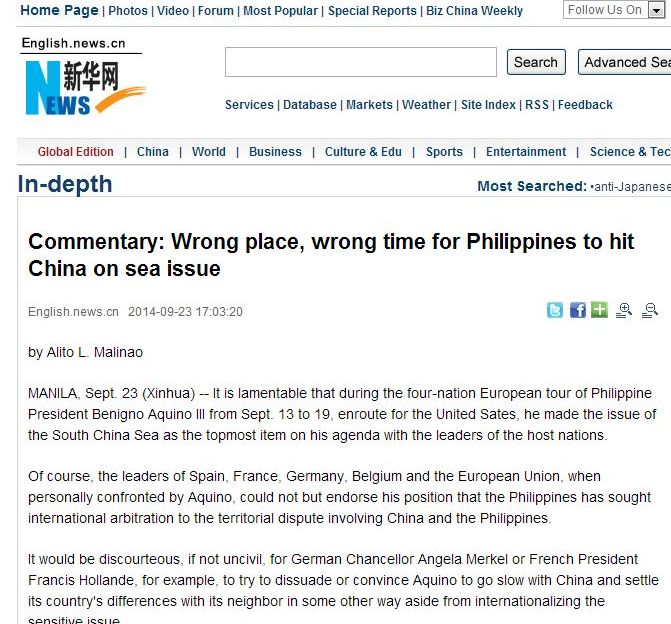PH journalist slams Aquino’s Europe trip in column in Chinese media
MANILA, Philippines—A Filipino opinion writer criticized President Benigno Aquino III for bringing up the issue of the maritime dispute between China and the Philippines in his trip to four European countries.
“It is lamentable that during the four-nation European tour of Philippine President Benigno Aquino III from Sept. 13 to 19, en route for the United Sates, he made the issue of the South China Sea as the topmost item on his agenda with the leaders of the host nations,” Alito Malinao said in his commentary published by China’s state-news agency Xinhua on Tuesday.
“Of course, the leaders of Spain, France, Germany, Belgium and the European Union, when personally confronted by Aquino, could not but endorse his position that the Philippines has sought international arbitration to the territorial dispute involving China and the Philippines,” he said.
Philippines and China are locked in a maritime dispute over the South China Sea which China claims in its entirety through the nine-dash line claim, which includes portions of the Philippines 200 nautical mile exclusive economic zone from Ilocos Norte in northern Luzon to Palawan and the Kalayaan Group of Islands.
The Philippines has challenged China’s claim before the International Tribunal on the Law of the Sea (Itlos) last January 2013 by filing an arbitration case.
China has refused to participate in the proceedings insisting on bilateral talks based on its “indisputable” and “historical” claim to the region believed to be rich in resources such as oil and natural gas.
The Philippines has also called for an immediate freeze on all activities in the South China Sea after China has found to be conducting reclamation projects on several reefs in the Spratly Islands.
Aquino’s move to seek international arbitration as a peaceful solution to the dispute was supported by the heads of the European countries he visited.
“It would be discourteous, if not uncivil, for German Chancellor Angela Merkel or French President Francis Hollande, for example, to try to dissuade or convince Aquino to go slow with China and settle its country’s differences with its neighbor in some other way aside from internationalizing the sensitive issue,” Malinao said.
“It would be unthinkable for the leaders of Europe to deny Aquino what he has sought for, because in doing so, they would be hurting the feeling of their esteemed guest. As hosts, they have no reason not to make their guest comfortable and happy,” he said.
Despite many countries sounding alarm over China’s “increasing aggressiveness” in the region through unilaterally establishing air defense identification zones and using force to turn away Filipino fishermen from the disputed waters, Malinao said that “China has never threatened to disturb the peace in the region.”
“China has time and again said that it is willing to resolve the issue peacefully through bilateral negotiations with the other claimant countries but without the intervention of any third country,” he said.
Malinao also criticized Aquino’s lack of mention of the recent travel advisory by the Chinese Ministry of Foreign Affairs urging Chinese nationals to refrain from going to the Philippines in light of security concerns after a foiled bomb plot against the Chinese Embassy.
The tourism industry of the Philippines has reportedly been severely hit after Chinese tourists cancelled flight and hotel bookings to the country.
“The cancellation would strike a loss to the country’s tourism industry of millions of dollars in potential revenues,” Malinao said.
“This is what Aquino failed to mention, even in passing, to his audience in Europe,” he said.
Malinao has authored a book on Journalism entitled “Journalism for Filipinos” published in 1991.
RELATED STORIES
Aquino to Spain PM: China too aggressive
For comprehensive coverage, in-depth analysis, visit our special page for West Philippine Sea updates. Stay informed with articles, videos, and expert opinions.
